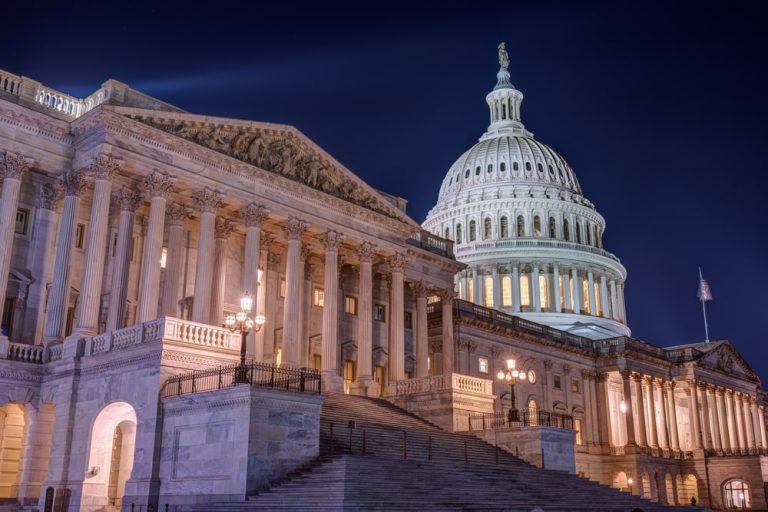In the February 2023 edition of The ICR D.C. Insider, we share our insights and analysis about developments in Washington that could have an immediate and long-term impact on your business.
What’s Coming Next In Washington
The first month of 2023 has already produced a number of important issues and policy developments, many of which will dominate the agenda in the coming year, including:
- The Debt Ceiling – In mid-January, Treasury Secretary Janet Yellen announced that the Treasury Department started taking “extraordinary measures” to keep paying the federal government’s bills as the U.S. hit its debt limit. In turn, House Republicans and the Biden Administration have begun their public (and private) back-and-forth on this critical issue, with the Administration sounding the alarm of a catastrophe and recession and House Speaker Kevin McCarthy declaring that will the U.S. will not default on its debt and that spending cuts need to be on the table as part of this negotiation. Given the June deadline for a deal, market, lawmaker and media anxiety will continue.
- Crypto – As the FTX, Celsius and Voyager fallout linger, crypto-focused issued continue to dominate legislative and regulatory priorities, include these key developments:
- Elizabeth Warren (D-Mass.) and Ron Wyden (D-Ore.) are putting pressure on the Public Company Accounting Oversight Board (PCAOB) to probe accounting firms that provided a clean bill of health to troubled crypto businesses. “When PCAOB-registered auditors perform sham audits – even for firms that may lay outside of the PCAOB’s jurisdiction – they tarnish the credibility of the PCAOB and undermine confidence in the PCAOB-registered auditors that investors and the public rely on when making investment decisions,” the Democrats wrote in a letter.
- Warren plans to re-introduce a bill with Sen. Roger Marshall (R-Kan.) to crack down on crypto money laundering, saying that she’s not floating a bill to rework consumer protections, an area where she believes regulators can already make a difference – and continued to praise SEC Chair Gary Gensler (and urge that he get more authority and funding), amidst criticism that the Commission has not fully used its existing authority.
- House Financial Services Committee Chairman Patrick McHenry (R-N.C.) has established a new subcommittee on digital assets, financial technology and inclusion to provide clear rules of the road among federal regulators for the digital asset ecosystem.
- Overall, the SEC’s actions against crypto firms increased 50% between 2021 and 2022. The actions that the SEC and Justice Department have already taken in 2023 year suggest heightened enforcement actions this coming year.
- Stock Buybacks – Less than a month after Democrats’ new tax on stock buybacks kicked in, Chevron’s announcement of a $75 billion stock buyback prompted Senate Finance Committee Chairman Wyden to advocate for Congress to hike this tax on oil companies to 25 percent from the current 1 percent.
SEC
- SEC Plans to Finalize Two Dozen Rules in 2023 – This basket of rules includes the SPAC rule proposed in March 2022. The SEC is proposing to require additional disclosures about sponsors, conflicts of interest and sources of dilution. The proposal also would require additional information about business combination transactions, including disclosures related to the fairness of the transactions.
- Climate Change Disclosure Rule – News and controversy around this rule proposal continues to build.
- Private companies may have to do ESG reporting One aspect of the proposed rule involves disclosing the greenhouse gas emissions produced directly by the company itself (Scope 1). The rule would also require disclosures of the indirect emissions from the electricity and other energy they purchase (Scope 2) as well as the upstream and downstream activities in their value chain (Scope 3), so a private company could get caught up in these disclosures too.
- More than 50 manufacturing trade associations want the SEC to scale back the climate disclosure rule and have called on Congress to put pressure on the agency to rewrite the proposal.
- April is being listed as the release date for the final climate change rule according to a recent federal notice, although the regulator says it “may consider or act on any matter earlier or later than the estimated date provided on the agenda.”
- Cybersecurity Breach & Board Expertise Rule – These proposed rules, first proposed in 2022, are expected to be finalized as soon as April 2023, and would require publicly traded companies who determine a cyber incident has become “material,” must make a public disclosure within four business days. The rules would also mandate further disclosures about a company’s policies and procedures to identify and manage cybersecurity risks, along with information about its board of directors’ oversight of cybersecurity risk and expertise.
- Private Fund Advisers Proposal – Buried in last year’s omnibus spending bill was the instruction that the SEC reconduct the economic analysis of the proposed a rule that would increase the disclosures from large hedge funds about their investment strategies and leverage.
- New Rule Proposed To Regulate Private Fund Advisers – The proposed rules are intended to increase transparency by requiring registered private fund advisers to provide investors with quarterly statements detailing certain information regarding fund fees, expenses and performance. Additionally, the proposed rules would prohibit private fund advisers, including those who are not registered with the SEC, from providing certain types of preferential treatment to investors in their funds and all other preferential treatment unless it is disclosed to current and prospective investors. The proposed changes also would create new requirements for private fund advisers related to fund audits, books and records, and adviser-led secondary transactions.
- Activist Investor Disclosure – While the SEC is finalizing its proposal to shorten the window for shareholders to alert the market (Schedule 13D and Schedule 13G filings) when they build an ownership stake of more than 5% of a company’s stock, the agency is likely to back off its most far-reaching proposals.
- ESG, Proxy Statements & House Republicans – Three Republican members of the House Financial Services Committee – Reps. John Rose (Tenn.), Bryan Steil (Wisc.) and Pete Sessions (Texas) – flagged their concerns about groups pressuring companies to take environmental and social stances in a letter to Chair Gensler and asked for details about how agency staff is handling rules around shareholder proposals that appear on proxy statements.
- Credit Rating Agencies & Potential Regulation – Eleven academics and investor advocates from groups like Better Markets, the Consumer Federation of America and Americans for Financial Reform are pressing the SEC to beef up the accountability of credit ratings agencies.
- A Bigger Budget – The 2022 approval of the omnibus spending bill included $2.2 billion for the SEC, the full amount that the roughly 4,500-person agency asked for in March.
- New Rules For Insiders Who Want To Sell Company Stock – The Commission approved a raft of rules governing the sale of company securities by corporate insiders.
- SEC Scrutiny Blocks Some Crypto Firms From Going Public – Increased SEC scrutiny has derailed some crypto companies’ efforts to go public over the last year.
FTC
- Non-Compete Agreement Ban Proposed – The FTC prosed a sweeping ban on non-compete agreements, estimating that the new proposed rule could increase wages by nearly $300 billion per year and expand career opportunities for about 30 million Americans. As of late January, more than 5,000 comments have been received. The President and CEO of the S. Chamber of Commerce is threatening litigation to stop this proposal.
- More Power Over Tech Mergers Sought – Buried in the FTC’s court filings in its lawsuits to block Microsoft’s acquisition of video game company Activision Blizzard and Meta’s takeover of virtual reality fitness app-maker Within is an aggressive effort for more authority. If the FTC can score a victory in either proceeding, it would do more than just block these deals, The FTC would arm itself with broad investigative authority over future acquisitions at Meta and Microsoft.
Additional Key Developments
- Justice Department & Self-Reporting – The Justice Department announced the expansion of its leniency policiesto persuade companies to take one of the biggest risks when it comes to dealing with the government: reporting their own misconduct to prosecutors. Companies that disclose wrongdoing to the Justice Department will not be prosecuted if they fully cooperate with investigators and fix the underlying problems, including any shortcomings in their compliance programs.
- New Penalties for Companies that Illegally Fire Workers Who Unionize – The National Labor Relations Board (NLRB) ruled to expand the fees and penaltiesthe agency can collect from employers that illegally terminate workers for labor activism, both union and nonunion. This move has been long sought by the labor movement.
- China
- Japan, Netherlands Agree to Limit Exports of Chip-Making Equipment to China – The two countries agreed with the U.S. to start restricting exports of advanced chip-manufacturing equipment to China, joining efforts by the Biden administration to slow China’s military development by cutting access to advanced technologies.
- More Chinese Companies Added to Trade Blacklist – The Commerce Department added another 36 Chinese high-tech companies, including makers of aviation equipment, chemicals and computer chips to an export controls blacklist citing concerns over national security, U.S. interests and human rights. The inclusion of the companies in the trade “Entity List” means that export licenses will likely be denied for any U.S. company trying to do business with them. In some cases, companies based in other countries are also required to comply with the requirements to prevent technologies from being diverted to uses banned under the export controls.
- New Restrictions on U.S. Investments in China on the Way – The Biden administration is leaning toward making its executive order on U.S. investments in China more focused and targeted than some of the earlier suggestions. The outbound executive order is the first step in creating new rules to complement the more established regulatory framework on inbound funds, which are reviewed by the Committee on Foreign Investment into the United States (CFIUS).



